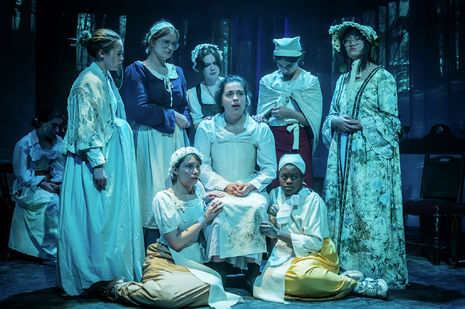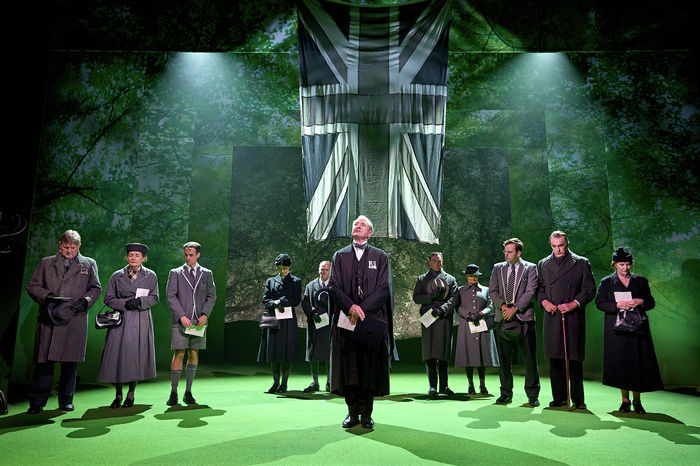The Welkin: What to expect and is she expecting?
The Welkin is not for the faint hearted (be weary if you’re an eighteenth century woman written by a man)

Lucy Kirkwood’s feminist spin on Reginald Rose’s 1954 play 12 Angry Men premiered in the National Theatre only a couple months before lockdown began. I am grateful to Mercy Brewer and Fiona Popplewell for snatching up a play that would have otherwise gotten away, and testing out a social experiment hypothesising female solidarity, gender-neutral justice, and internalised sexism in the eighteenth century.
“How does a group of disenfranchised women, finally granted a strange dominion over another life, go about justice?”
That said, take (a coffee!) shot and choose a seat near the front because three hours of court proceedings is trying. Twelve women on the “jury of matrons” have to investigate whether a woman sentenced to hang is truly pregnant ("quick with child"). Should the verdict be a unanimous “yes” and she qualifies for the common law defence of “pleading the belly”, effectively escaping the death penalty. So how does a group of disenfranchised women, finally granted a strange dominion over another life, go about justice? More comically, with all the knowledge of 1758 rural Suffolk, how do they begin to look, touch, smell, or taste for pregnancy? After all, the “body is not a machine.”
The start of the play is slightly opaque; the fast spoken dialect against the interruptions of the banging butter churning left me wishing I could reach for the subtitles button. However, it warms up and we quickly see the well executed layering of the play. Pockets of debate and clock chimes overlap to create a market square of dialogue - there’s always somewhere to look. This said, the ADC is inevitably a small stage to fit fourteen actors on a furnished set without feeling claustrophobic. Therefore, the beautifully framed stills they created against Edward De’Ath’s lighting were deeply welcomed to ease the tension.
“Simultaneously a soap opera and a comedic insight into a full clothed women’s changing room”
Harriet Haylock (who plays Sally Poppy) succeeds in making enemies of sympathetic mothers in the audience. Her closing scene with Eliza Harrison is certainly impressive and provides literary deja-vu that harkens back to the intensity of platonic female relationships explored by Greta Gerwig’s 2019 Little Women. The female gaze also finds itself in the play's representation of the female body from menopause to masturbation, breastmilk and self-induced abortion. Brewer and Popplewell successfully avoid common tropes of hysterical women in their direction; Amy Brian’s teary performance genuinely evokes heartache. However, Kirkwood’s play is also light-hearted, simultaneously a soap opera and a comic insight into a fully clothed women’s changing room. Hats off to Pauline Eller’s persistent hot flushes: we could feel the heat!
Lizzy Riley and Dominika Wiatrowska as a duo also seemed to have a lot of fun – I’d grab a drink with them. It was certainly entertaining hearing twelve varied voices chiming in on their strange pregnancy cravings from soil to soap. This comic world seems far from the NHS website’s royal blue font of pregnancy symptoms, and yet it remains a vulnerably authentic account when compared to the modern tendency to airbrush pregnancy (see Beyonce’s twin pregnancy photos; angelic and outlined in floral garlands).

A Voyage Round My Father goes nowhere
The play as a feminist period piece poses a gloomy conclusion for women’s rights today. This is done through visual projections of modern women in professional and domestic settings between set changes. We may have television, dishwashers, female billionaires and supreme court justices, but how far will womens’ freedoms from domesticity have come upon the next arrival of Halley’s comet? This potentially comes across as a little on the nose. The same might be said of the ‘mansplaining’ buffoon of a doctor, but Seb Gentile was certainly worth the laughs.
So set aside some time and a clear state of mind, and go give The Welkin a watch. As a law student I was surprised to feel a neutrality to the conclusion of the play - justice or injustice. But whatever your feelings, the ADC has certainly done justice to this female narrative.
 News / Cambridge academics stand out in King’s 2026 Honours List2 January 2026
News / Cambridge academics stand out in King’s 2026 Honours List2 January 2026 Interviews / You don’t need to peak at Cambridge, says Robin Harding31 December 2025
Interviews / You don’t need to peak at Cambridge, says Robin Harding31 December 2025 News / AstraZeneca sues for £32 million over faulty construction at Cambridge Campus31 December 2025
News / AstraZeneca sues for £32 million over faulty construction at Cambridge Campus31 December 2025 News / News in Brief: Maypole mentions, makeovers, and moving exhibits4 January 2026
News / News in Brief: Maypole mentions, makeovers, and moving exhibits4 January 2026 Features / “It’s a momentary expression of rage”: reforming democracy from Cambridge4 January 2026
Features / “It’s a momentary expression of rage”: reforming democracy from Cambridge4 January 2026









